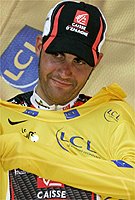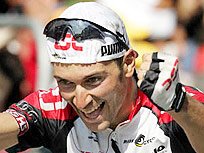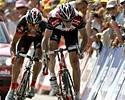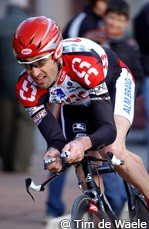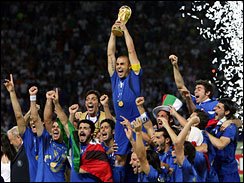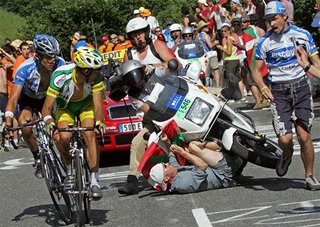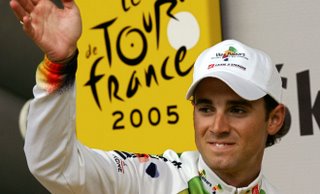
Take it from someone who's been following the Tour for 30 years, this one was special. If you haven't seen it, or even if you have, make sure and catch (Tivo, tape...) OLN's recap show next week or buy the World Cylcing Videos dvd when it comes out. It may not have been quite as exciting as the '89 LeMond comeback victory over Laurent Fignon, but it's right up there. Definitely one of the great sporting events of my lifetime.
The circumstances surrounding the American Tour winners, Greg LeMond, Armstrong, and Landis are uncannily similar and beg the question "what's next for Floyd?" We know that he's having his hip replaced, so we begin with a 100% chance that it won't be a run-of-the-mill story already.
Le Mond, like Armstrong, was an ultra special athete at a very young age and could have won more tours if not for politics and adversity. He probably had to give one up in order to help his teammate, Bernard Hinault, win his fifth. Then he had to race against his teammate to win his first. Instead of this leading to a string of victories, it was the set-up for an amazing comeback.
LeMond was accidentally shot while hunting during the offseason, nearly died, and defied his doctor's predictions to come back to bike racing at all. When he did make it back, he was terrible; often not even able to finish races. In the '89 Giro d'Italia--two years after his accident--he fought just to finish within the time cut. But his hard work paid off and by the end of this tour he was keeping up with the leaders. That year, he won probably the most amazing Tour de France in history by 8 seconds. The next year he won again.
Next is the Armstrong story which is now a household tale in the US. The youngest world champion in history; Armstrong was never a complete rider until after his bout with cancer. During his first tour victory, he didn't have to compete against the best riders of his era, leading to a lot of "what if?" talk that created a massive amount of press for his second tour.
Enter Landis. Mennonite upbringing who used biking to escape. He had enormous talent but needed to learn how to live in the real world, something that probably slowed his rise into the top ranks, which he enters in order to work for Armstrong. He leaves the Postal (Lance's team) in order to have his own chances to win and when he finally reaches his peak, the race is filled with controversy and his hip gives out on him. It's bizarrely coincidental.
As for his future, we have no idea. In theory, his hip should be fine. However, it will still require everything to go well, a long rehab process, and probably just a bit of luck because even though a hip replacement is a simple procedure these days I don't think it's been tested when the patient has needed to return to world class athletic form.
Beyond this, we've still got the "what if?" question. Jan Ullrich, Francisco Manecebo, Ivan Basso, Alexander Vinokurov, and Alejandro Valverde all didn't race because of either doping scandal or crashing out. When they come back--of if, in some cases--the race is going to be different. Which is exactly what everyone said after Lance's first victory.
This means, basically, that next year promises to be fantastic and that you should become a cycling fan. So order OLN, bookmark Cyclingnews and Eurosport and, most of all, buy yourself a bike and get out there. Maybe someday, you'll even ride the Tour de France.
Ride The Tour article
The circumstances surrounding the American Tour winners, Greg LeMond, Armstrong, and Landis are uncannily similar and beg the question "what's next for Floyd?" We know that he's having his hip replaced, so we begin with a 100% chance that it won't be a run-of-the-mill story already.
Le Mond, like Armstrong, was an ultra special athete at a very young age and could have won more tours if not for politics and adversity. He probably had to give one up in order to help his teammate, Bernard Hinault, win his fifth. Then he had to race against his teammate to win his first. Instead of this leading to a string of victories, it was the set-up for an amazing comeback.
LeMond was accidentally shot while hunting during the offseason, nearly died, and defied his doctor's predictions to come back to bike racing at all. When he did make it back, he was terrible; often not even able to finish races. In the '89 Giro d'Italia--two years after his accident--he fought just to finish within the time cut. But his hard work paid off and by the end of this tour he was keeping up with the leaders. That year, he won probably the most amazing Tour de France in history by 8 seconds. The next year he won again.
Next is the Armstrong story which is now a household tale in the US. The youngest world champion in history; Armstrong was never a complete rider until after his bout with cancer. During his first tour victory, he didn't have to compete against the best riders of his era, leading to a lot of "what if?" talk that created a massive amount of press for his second tour.
Enter Landis. Mennonite upbringing who used biking to escape. He had enormous talent but needed to learn how to live in the real world, something that probably slowed his rise into the top ranks, which he enters in order to work for Armstrong. He leaves the Postal (Lance's team) in order to have his own chances to win and when he finally reaches his peak, the race is filled with controversy and his hip gives out on him. It's bizarrely coincidental.
As for his future, we have no idea. In theory, his hip should be fine. However, it will still require everything to go well, a long rehab process, and probably just a bit of luck because even though a hip replacement is a simple procedure these days I don't think it's been tested when the patient has needed to return to world class athletic form.
Beyond this, we've still got the "what if?" question. Jan Ullrich, Francisco Manecebo, Ivan Basso, Alexander Vinokurov, and Alejandro Valverde all didn't race because of either doping scandal or crashing out. When they come back--of if, in some cases--the race is going to be different. Which is exactly what everyone said after Lance's first victory.
This means, basically, that next year promises to be fantastic and that you should become a cycling fan. So order OLN, bookmark Cyclingnews and Eurosport and, most of all, buy yourself a bike and get out there. Maybe someday, you'll even ride the Tour de France.
Ride The Tour article



